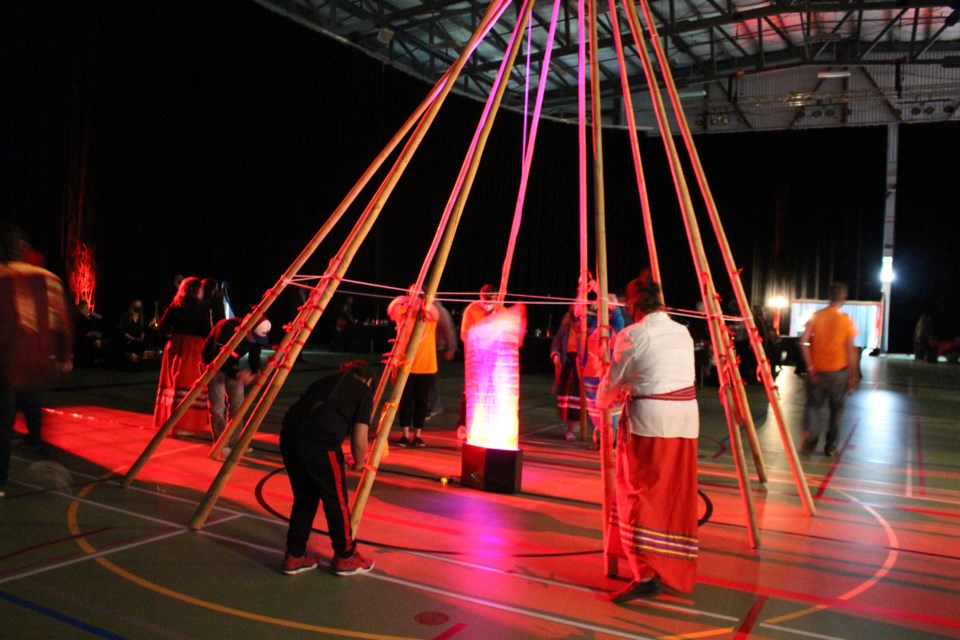BONNYVILLE – On the evening of Oct. 4, individuals and families from across the Lakeland region arrived at the Bonnyville and District Centennial Centre (C2) to honour and pay remembrance to the disproportionately high rate of Indigenous women and girls who have been murdered and have gone missing in Canada.
Also mourned for the first time during the annual event was the young lives that were lost while attending Canada’s Indian Residential Schools.
By the end of September, more than 1,300 remains have been reported to have been located in unmarked graves at the sites of former residential schools across Canada through the use of ground penetrating radar.
In early spring, 215 remains were identified in Kamloops, B.C., then 182 were discovered in Cranbrook, B.C., and more than 160 remains have been found on Penelakut Island, B.C. Leaders from Cowessess First Nations also announced that 751 remains had been uncovered this summer with ground penetrating radar in Marieval, Sask.
Opening the ceremony, prayers were made in English by Pastor Dwyane Mitchell and in Cree by Elder Francis Dumais.
Janet Gobert, the community initiatives coordinator with the Bonnyville Friendship Centre, welcomed guests and local dignitaries.
Giving short welcoming addresses were MLA Dave Hanson, MD Reeve Greg Sawchuk and the Town of Bonnyville’s Mayor Gene Soblowski, as well as the President of the Friendship Centre Rick Jerome and Executive Director Lauri Fitzpatrick.
Throughout the evening music was performed by the Poundmaker Drum Group with a special song performed by Jayda Gadwa from Kehewin First Nations.
The purpose of the event was to bring attention to the ongoing trend of higher rates of Indigenous women and children who go missing and are murdered across the country, compared to the general population.
This vigil dedicated to Murdered and Missing Indigenous Women (MMIW) and the stolen children is “to increase awareness within communities – but not only in communities – with each person present to make it real to them,” Gobert explains.
“We can look at symbolism, and we can hold vigils like this, but unless we take ownership, and we become advocates for our Kokums, our grandmothers, our sisters, our daughters, our grandchildren, it's really null or – void is a better word.”
Somber statistics
Guests in attendance heard somber statistics released by the Native Women's Association of Canada (NWAC) based on data collected before March 31, 2010.
Gathered from 582 cases of missing and murdered First Nations women and girls, NWAC reported 67 per cent were considered murder cases. These deaths were deemed the result of homicide or negligence. Approximately 20 per cent remain open cases of missing women or girls.
Of the cases, four per cent have been considered suspicious deaths by NWAC, where “deaths regarded as natural or accidental by police, but considered suspicious by family or community members.”
The remaining nine per cent are cases where the nature of the case is unknown. “It is unclear whether the woman was murdered, is missing or died in suspicious circumstances,” states the NWAC fact sheet.
“Most of these cases occurred in the Western provinces. More than a quarter, 28 per cent, of all cases occurred in British Columbia, followed by Alberta with 16 per cent of cases. Overall, more than half, 54 per cent, of cases occurred in the West,” read Denis Steinhauer.
Following the statistics, personal, painful and traumatic stories were shared by two survivors of targeted abuse – Pauline Cardinal Mawer and Gobert. Also featured was a video sent by Shaylene Goforth, whose sister, Kelly Goforth, was one of the victims of Regina’s first serial killer.
Gobert says sharing these traumatic stories may be uncomfortable for audience members to hear, but it is an important part of raising awareness to the plight of Indigenous women and girls facing disproportionate rates violence.
“It is uncomfortable. It really is, but it has to be told... It’s all awareness,” she says.
“I have never kept (the abuse inflicted on me by a stranger) a secret from my own daughters. I have taught them that they need to advocate for themselves,” Gobert told Lakeland This Week.
Sharing what Gobert’s mother had told to her following her assault, she tells other women who have faced similar trauma, “You will never allow this to define you or who you will become because of this.”
Gobert adds, her mother’s words are something she has taken to heart, giving her a very strong voice against similar injustices.
"And so, even with my own daughters, I feel it's important that we instill in our daughters the courage to speak up,” she said.



